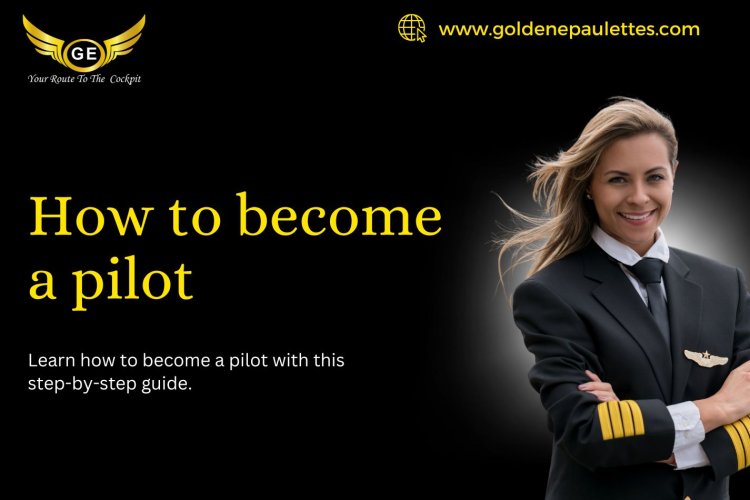How to Get Hired by a Major Airline
Becoming a pilot for a major airline is a dream career for many aspiring aviators.

How to Get Hired by a Major Airline
Becoming a pilot for a major airline is a dream career for many aspiring aviators. With attractive salaries, exciting travel opportunities, and career growth, working for a top airline is a coveted goal. However, the journey to securing a job with a major airline requires dedication, training, experience, and strategic career planning. In this guide, we will break down the key steps to getting hired by a major airline, integrating the keyword howtobecomepilot to help aspiring pilots find relevant information on this journey.
1. Obtain the Necessary Education and Training
The first step in securing a job with a major airline is acquiring the necessary education and training. Airlines require pilots to have a solid educational foundation in aviation.
a) Choose the Right Educational Path
-
Bachelor’s Degree: While not always mandatory, many major airlines prefer candidates with a degree in aviation, aeronautical science, or a related field.
-
Flight School: Enroll in a certified flight training school to obtain essential pilot licenses.
b) Obtain Pilot Licenses
To meet airline requirements, you need to earn the following licenses:
-
Private Pilot License (PPL): The first step in your pilot career.
-
Commercial Pilot License (CPL): Required to fly professionally.
-
Instrument Rating (IR): Necessary for flying in poor weather conditions.
-
Multi-Engine Rating (MER): Required for flying multi-engine aircraft.
-
Airline Transport Pilot License (ATPL): The highest level of pilot certification, mandatory for airline captains.
These licenses require intensive training, flight hours, and passing rigorous tests to qualify as a commercial pilot.
2. Accumulate Flight Experience
To get hired by a major airline, pilots need to gain extensive flying experience. Airlines have minimum flight hour requirements, typically ranging from 1,500 to 3,000 hours of total flight time.
a) Gain Experience as a Flight Instructor
One of the best ways to accumulate flight hours is by becoming a Certified Flight Instructor (CFI). This allows pilots to log hours while training new students, improving their skills, and earning a salary.
b) Work for a Regional Airline
Before transitioning to a major airline, many pilots start their careers at regional airlines. These airlines operate smaller aircraft on domestic routes, offering pilots an opportunity to build flight experience and prepare for larger commercial jets.
c) Military Experience as a Pilot
Another pathway is through the military, where pilots receive rigorous training and log extensive flight hours, making them highly attractive candidates for major airlines.
3. Develop Key Pilot Skills
Aside from technical skills, airlines seek pilots who demonstrate strong leadership, decision-making, and communication abilities.
a) Technical Proficiency
-
Master complex aircraft systems.
-
Understand navigation, meteorology, and air traffic control procedures.
-
Stay updated with the latest aviation technology.
b) Soft Skills
-
Leadership: Pilots must lead crew members effectively.
-
Communication: Clear communication with air traffic control, co-pilots, and cabin crew is essential.
-
Decision-Making: Quick thinking and problem-solving abilities are crucial in emergencies.
-
Situational Awareness: Pilots must stay alert to their surroundings, weather, and aircraft performance.
4. Meet Airline Hiring Requirements
Each airline has specific requirements for hiring pilots. Understanding these requirements can help you tailor your training and experience accordingly.
a) Minimum Flight Hours
-
Most major airlines require between 1,500-3,000 flight hours.
-
Having turbine engine experience improves job prospects.
b) Medical Certification
Pilots must pass a Class 1 Medical Certificate to ensure they are physically and mentally fit to fly commercial aircraft.
c) Clean Background Check
-
No criminal records or history of drug or alcohol abuse.
-
Clean flight record with no major violations.
5. Prepare a Strong Resume and Application
A well-crafted resume and application significantly increase your chances of getting hired by a major airline.
a) Highlight Key Achievements
-
Total flight hours and certifications.
-
Experience with different aircraft types.
-
Leadership roles, awards, and recognitions.
b) Customize for Each Airline
-
Research airline-specific requirements and tailor your resume accordingly.
-
Mention any direct experience relevant to the airline’s fleet and operations.
c) Get Strong Recommendations
-
Obtain letters of recommendation from flight instructors, previous employers, or senior pilots.
6. Pass the Airline Assessment and Interview
After submitting your application, airlines conduct a series of assessments to evaluate your suitability for the role.
a) Written Exams
-
Airlines test technical knowledge, including navigation, meteorology, and aviation regulations.
b) Simulator Assessments
-
Candidates must demonstrate flying proficiency in airline-specific aircraft simulators.
c) HR and Technical Interviews
-
HR Interview: Questions on teamwork, leadership, and decision-making.
-
Technical Interview: Questions related to flight operations, aircraft systems, and emergency procedures.
7. Complete Airline Training and Type Rating
Once selected, new hires must undergo airline-specific training, including a Type Rating, which certifies them to fly a particular aircraft model (e.g., Boeing 737, Airbus A320).
a) Type Rating Certification
-
This specialized training includes classroom sessions, simulator training, and supervised flight operations.
b) Initial Operating Experience (IOE)
-
New pilots fly under the supervision of experienced captains before operating independently.
8. Continue Professional Development
Even after getting hired by a major airline,howtobecomepilot pilots must continue learning and improving their skills.
a) Regular Training and Assessments
-
Airlines require pilots to complete periodic training to stay updated with new regulations and technologies.
b) Upgrade to Captain
-
Pilots can progress from First Officer to Captain, which requires additional experience and leadership skills.
c) Join Pilot Associations
-
Organizations like ALPA (Air Line Pilots Association) and IFALPA (International Federation of Airline Pilots’ Associations) provide networking opportunities and career support.
Conclusion
Securing a job with a major airline is a long but rewarding journey that requires dedication, training, and experience. By following the right educational path, gaining extensive flight experience, and preparing thoroughly for airline assessments, you can increase your chances of being hired. The aviation industry offers a promising career, and if you follow the howtobecomepilot roadmap effectively, you can achieve your dream of flying for a major airline.
If you're serious about becoming an airline pilot, start by enrolling in a reputable flight school, accumulating flight hours, and preparing for airline assessments. The sky is not the limit—it’s just the beginning of your journey to success!
What's Your Reaction?

















.jpg)